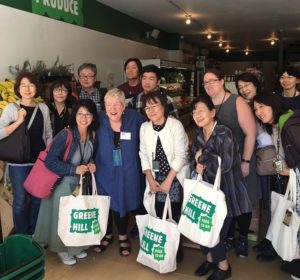Seikatsu Comes to New York City
Earlier this Fall, CEANYC had the opportunity to host 13 visitors from the Seikatsu Club Consumer Cooperative Union (Seikatsu). Seikatsu is a consumer co-op federation that includes 32 different autonomous cooperatives spanning 21 prefectures (similar to U.S. states) across Japan. While Seikatsu initially formed with 200 Japanese housewives initiating a buying club for safe and affordable milk, membership now exceeds 370,000 different families. They have been innovators in sustainability, holding Japanese producers accountable to strict and progressive ecological standards; developed a robust education and training program; created worker cooperatives in care industries; and are entirely women-led and volunteer-run.
CEANYC is grateful to have participated in a learning exchange with the Seikatsu delegation, in which we hosted a public panel moderated by Dr. Michael Menser (whose book We Decide! includes a chapter on Seikatsu), as well as took them to see various cooperatives and solidarity economy enterprise in New York City.
The Seikatsu delegation was able to visit two food co-ops in New York City, both of which are member-labor co-ops: Park Slope Food Coop—where Seikatsu learned about CEANYC and our work, toured the food co-op, and spent some time discussing consumer cooperation with founder and General Coordinator Joe Holtz— and the Greene Hill Food Co-op.
We also shared lunch with developers and worker-owners at Center for Family Life, where NYC cooperative developers got to learn about the Seikatsu model, while also explaining Up and Go, a platform that connects worker-owned businesses to consumers. The Seikatsu team then got to visit Cooperative Home Care Associates—the largest worker cooperative in the country— where we took a tour of the offices and learned about unionization efforts within the United States healthcare industry.
Last, we visited two gardens in The Bronx—New Roots Community Farm and La Finca del Sur—where longtime gardeners and urban farmers Sheryll Durant and Jess Turner (CEANYC Peer Educator) showed explained a bit about the history and context of community gardens in the city. La Finca del Sur is an urban farmer cooperative led by Latina and Black women. New Roots is part of the International Rescue Committee, and works to teach food production to South Bronx residents and asylee and refugee clients of the IRC.
Key Takeaways and Distinctions Worth Considering
- Seikatsu has a robust community education program, where women gather frequently to learn more about Seikatsu and share food and recipes, which supports growth and familiarity with the cooperative model
- Seikatsu is entirely volunteer-run, which may be due in large part to its being comprised of primarily middle to upper class housewives, distinct from solidarity economy practitioners in New York City who are primarily low to moderate income women
- Seikatsu operates as one brand and one cooperative, running distinct depots or storefronts, whereas consumer cooperatives in New York City function autonomously of each other
- Whereas consumer cooperatives in New York City source from a variety of producers, Seikatsu Club members elect a committee to, based on collectively agreed upon standards, find the single product that best meets the needs and desires of the membership, effectively eliminating shopping (their slogan is, in fact, ‘stop shopping’)
- New York City is comprised of a broader diversity of racial and ethnic backgrounds, with more languages spoken
- Cooperative development is heavily reliant upon philanthropy in the United States, a funding stream distinct from Japan


